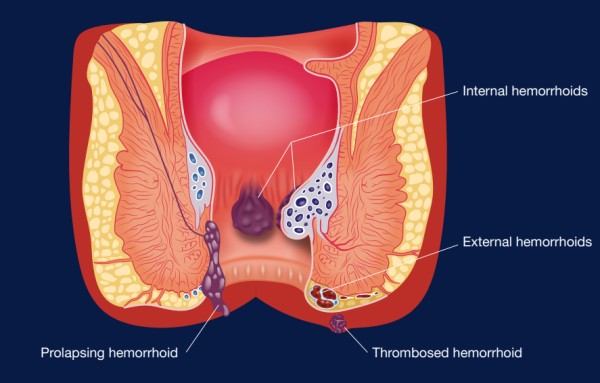
What are hemorrhoids?
Hemorrhoids are swollen, enlarged veins that form inside and outside the anus and rectum. Also known as piles, they can be painful and cause rectal bleeding.
An estimated 1 in 20 Americans have symptomatic hemorrhoids. They affect people of all ages, genders, races, and ethnicities. They’re more common as you age, affecting more than half of people over 50. Many treatment options are available for hemorrhoids, including over-the-counter remedies, surgical procedures, and minimally invasive options.

Types of hemorrhoids
There are four types of hemorrhoids:- Internal hemorrhoids are the most common type. They occur inside the rectum and usually aren’t painful.
- External hemorrhoids are the least common type. They occur at the opening of the anus and can be very painful.
- Prolapsed hemorrhoids are internal hemorrhoids that have slipped outside the anus.
- Thrombosed hemorrhoids are hemorrhoids that are filled with blood clots. They can be internal or external. When external, they can be painful.
Causes of hemorrhoids
Hemorrhoids happen when strain is placed on the veins in your anus and rectum. Anything that increases pressure on your belly or lower extremities can cause these veins to become swollen or inflamed.
Hemorrhoids may develop due to:- Pelvic pressure from weight gain, especially during pregnancy
- Constipation or pushing hard to have a bowel movement
- Weightlifting or straining to lift heavy objects
Symptoms of hemorrhoids
Bleeding is the most common symptom of hemorrhoids. You may see blood on toilet paper after wiping, in your stool, or in the toilet bowl.
Other symptoms of hemorrhoids include:- Itchy anus
- Hard lumps near the anus that feel sore or tender
- Pain or ache in the anus, especially when you sit
Non-Surgical Hemorrhoid Treatment
If you have internal and/or external hemorrhoids, an Azura Vascular Care center may be able to help with Hemorrhoid Artery Embolization (HAE). During this procedure, a special doctor, called an interventional radiologist, uses x-ray guidance to insert a catheter through your upper leg or wrist and into the arteries that are connected to the hemorrhoids. Tiny coils are released through the catheter to block the arteries supplying blood to the hemorrhoid. This procedure can help alleviate pain and bleeding associated with the condition. HAE is painless and requires virtually no recovery time.
Other benefits include:- Requires only conscious sedation
- Does not cause scarring
- Is nearly painless and allows for fast recovery at home
- Can be done at an outpatient center
- Provides a reduced risk of infection
- Makes it much less likely for hemorrhoids to come back
If you are not a candidate for this procedure, there may be surgical options available to you by your gastroenterologist or surgeon.
About 93% of patients see improvement in hemorrhoid-related symptoms without additional treatment within one month of HAE.
Who is a candidate for hemorrhoid artery embolization?
You may be a candidate for hemorrhoid artery embolization if you:- Have been diagnosed with internal and/or external hemorrhoids
- Are experiencing symptoms like rectal bleeding and pain for at least 3 months
- Have tried other treatments (e.g. sclerotherapy, banding) that have not worked
- Want to avoid surgery to treat your hemorrhoids

Why Choose Us?
- Our board-certified physicians are experts in vascular and interventional radiology
- Minimally invasive treatments in a comfortable outpatient environment–no hospitalization needed
- We work with all major insurance plans
- No referral needed. Request a consultation at a center near you to schedule an evaluation and treatment within several days.

